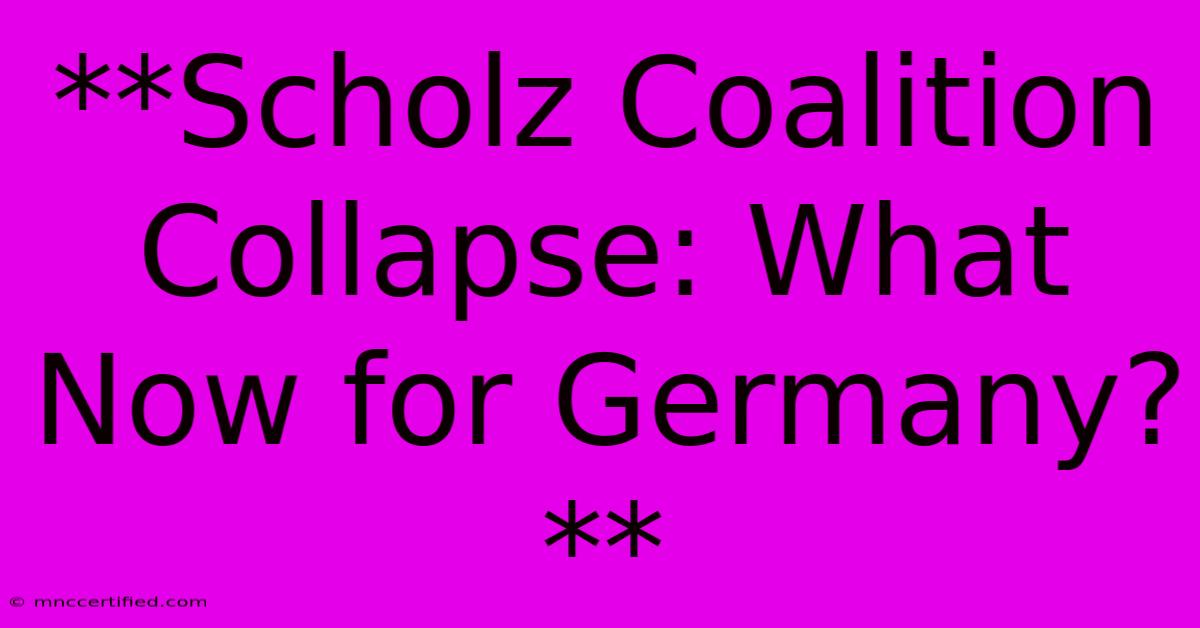**Scholz Coalition Collapse: What Now For Germany?**

Table of Contents
Scholz Coalition Collapse: What Now for Germany?
The potential collapse of Germany's governing coalition, led by Chancellor Olaf Scholz, has sent shockwaves through German politics and beyond. With the Green Party threatening to withdraw from the coalition, questions abound about the future of German leadership, the country's political landscape, and the implications for Europe as a whole.
The Cracks in the Coalition
The coalition, formed in December 2021, has faced significant strain from the outset. The three parties – the Social Democratic Party (SPD), the Green Party, and the Free Democratic Party (FDP) – represent diverse ideologies, leading to disagreements on key policy issues.
Key Points of Friction:
- Climate Policy: The Greens' ambitious climate goals have clashed with the FDP's focus on economic growth and their opposition to stricter environmental regulations.
- Energy Policy: The war in Ukraine has amplified tensions around Germany's reliance on Russian energy. The Greens advocate for a swift transition to renewable energy, while the FDP prioritizes nuclear power and maintains a more cautious approach.
- Social Welfare: The SPD seeks to expand social welfare programs, while the FDP prioritizes tax cuts and limited government spending.
The Green Party's Ultimatum
The Greens have expressed growing frustration with the coalition's lack of progress on crucial issues, particularly climate policy. They have issued an ultimatum, threatening to withdraw from the government if their demands are not met.
Potential Consequences:
- New Elections: A coalition collapse could trigger snap elections, leading to prolonged political uncertainty.
- Political Gridlock: Even if the coalition manages to stay afloat, the lack of unity could result in further policy deadlock.
- Economic Instability: Political turmoil can create economic instability, potentially impacting the German economy and Europe as a whole.
What's Next for Germany?
The current situation remains volatile. The coalition faces a crucial test in the coming weeks as they negotiate a way forward.
Possible Outcomes:
- Compromise: The coalition could attempt to reach a compromise on key issues, potentially through concessions from all parties.
- Resignation: The Chancellor or other key figures could resign, leading to a reshuffle of the government.
- New Elections: If the coalition collapses, new elections would likely be held.
Implications for Europe
The political turmoil in Germany could have far-reaching consequences for Europe. Germany's economic and political influence makes it a key player in shaping the European Union's policies.
Potential Impacts:
- EU Policymaking: A weakened German government could impact the EU's ability to respond effectively to challenges such as climate change, energy security, and geopolitical tensions.
- Transatlantic Relations: The situation could also affect Germany's role in transatlantic relations, especially in light of the war in Ukraine and the changing global power dynamics.
Conclusion
The potential collapse of Germany's governing coalition is a significant development with potentially far-reaching consequences. The coming weeks will be crucial for determining the future of German politics and its impact on Europe. It remains to be seen whether the coalition can overcome its internal divisions and find a path to stability. However, one thing is certain: the situation in Germany is likely to remain a major focal point for international observers in the months to come.

Thank you for visiting our website wich cover about **Scholz Coalition Collapse: What Now For Germany?** . We hope the information provided has been useful to you. Feel free to contact us if you have any questions or need further assistance. See you next time and dont miss to bookmark.
Featured Posts
-
Burnleys Draw At West Brom Raises Controversy
Nov 08, 2024
-
Internet In North Korea Initial User Behavior
Nov 08, 2024
-
No Return For Sancho Palmer In Training
Nov 08, 2024
-
Nuggets Fans Witness Westbrooks Style Early On
Nov 08, 2024
-
Sutton National Insurance Company Bamboo
Nov 08, 2024